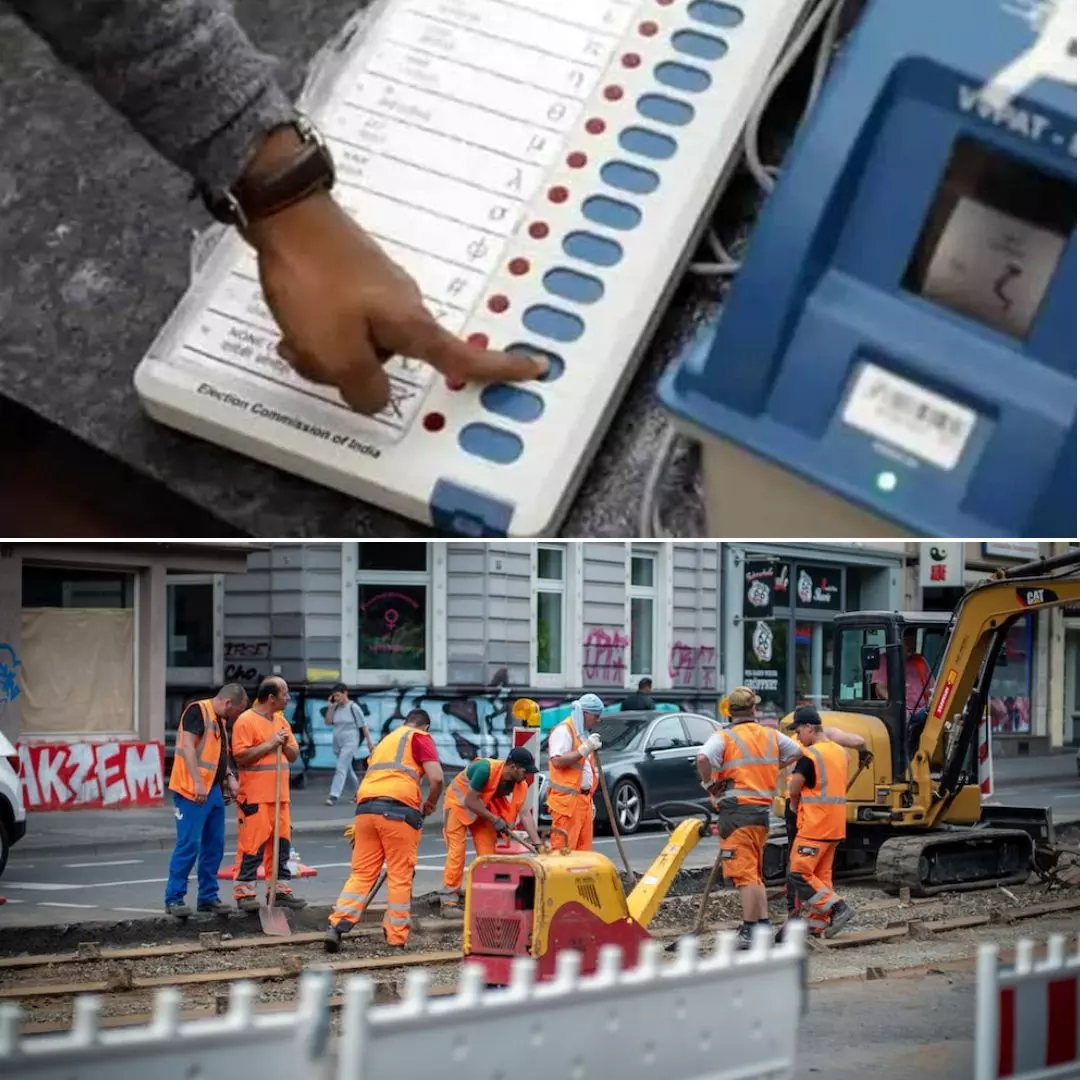
Image Credits: Unsplash (Representational), Hindustan Times
EC Develops First Prototypes Of Remote Voting Machines For Domestic Migrants; Here's All You Need To Know
Writer: Laxmi Mohan Kumar
She is an aspiring journalist in the process of learning and unlearning many things. Always up for discussions on everything from popular culture to politics.
India, 30 Dec 2022 11:35 AM GMT
Editor : Shiva Chaudhary |
A post-graduate in Journalism and Mass Communication with relevant skills, specialising in content editing & writing. I believe in the precise dissemination of information based on facts to the public.
Creatives : Laxmi Mohan Kumar
She is an aspiring journalist in the process of learning and unlearning many things. Always up for discussions on everything from popular culture to politics.
The Remote EVMs would enable migrant workers to vote from their place of work instead of travelling miles to vote from their native constituency. This way, the Election Commission hopes to bring in more voter participation.
The Election Commission (EC) has developed a remote voting machine prototype that would enable domestic migrant voters to cast votes without having to take the trouble of travelling to their respective constituencies. The prototype would be a positive step toward facilitating migrants a chance to cast their votes without having to travel miles to their wards. The multi-constituency remote EVM can handle up to 72 constituencies from one remote polling booth.
Soon after the prototype was announced, the EC invited all recognised national and 57 state political parties for a demonstration of the remote EVM on January 16, 2023, after which they can submit their written views by January 31. Chief Election Commissioner Rajiv Kumar conveyed through a statement that, "After focus on youth and urban apathy, remote voting will be a transformational initiative" toward strengthening participation in electoral democracy.
Facts In Hand Regarding Remote EVMs
Here are some of the major facts and changes that can be expected with the implementation of the new voting systems that can handle multiple constituencies from a single remote booth;
- The multi-constituency remote EVM can handle up to 72 constituencies from a single remote polling booth and has now explored the option of using a modified version of the time-tested model of M3 (Mark 3) EVMs to enable voting outside home constituencies for domestic migrants.
- The Representation of the People Act, 1950 and 1951, The Conduct of Election Rules, 1961, and The Registration of Electors Rules, 1960, are among the rules that would require amendments with the introduction of remote voting.
- The technicalities of remote voting still require certain clarity. The EC is yet to deliberate on the secrecy of voting, facilities for polling agents to identify voters, process and method of remote voting, counting of votes, and transmitting them to the returning officer located in another state.
According to an article by The Indian Express, once the EVM gets implemented after necessary deliberations, it can potentially lead to a "social transformation for the migrants and connect with their roots." Earlier the EC had noted that many times the migrants are reluctant to get themselves enrolled in the voter's list at their place of work for reasons such as - frequency of changing residences, not enough connection with the place of migration, and unwillingness to delete their names from the electoral roll in their native constituencies.
According to the EC, such migration-based disenfranchisement should not be a thing in the age of technological advancement. Furthermore, he quoted the voter turnout observed in the General Elections of 2019 being 67.4 per cent and expressed his concern of over 30 crore electors not exercising their franchise. Additionally, as per EC, while there could be a multitude of reasons for a voter opting out of registering in their new place of residence, the inability to vote should not be one. He hoped to address this concern and find a solution through the remote EVMs.
Supreme Court's Directive Taking Form After Years
As per the commission's statement, each RVM would function as a stand-alone non-networked system, like the currently used EVM. It would carry the same kind of security features and would be used in multi-constituency polling stations set up in remote locations. The system would include domestic migrant pre-registering through online or offline registrations within the pre-notified time before elections. Once registered, the request will be cross-verified with details at the home constituency, followed by establishing the remote voting polling stations in the places of the current residence of the migrant voters.
The initiative comes seven years after the Supreme Court's instruction to explore giving remote voting options to domestic migrants. It was understood that around 85 per cent of the internal migration was within states, and many of them faced issues with the voting procedure. Based on the directives received in June 2015, the EC has now sought the views of the political parties on required amendments and other legal challenges in using the RVMs. On an administrative level, a more robust system would have to be implemented to ensure proper enumeration of remote voters, their secrecy of voting, and provisions to help personnel identify voters and avoid impersonation.
Also Read: The Curious Case Of Missing EVMs
 All section
All section














